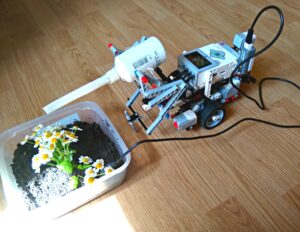STEAM K12 project
The aim of the STEAM K12 project was to provide students of teacher training with the ability to use different STEAM approaches: robotics, sensors, virtual and augmented reality, electronics, statistics to enrich the subject with technology. Students learned to use tools to apply modern learning methods and to influence learning outcomes.
According to the Digital Compass 2019 report, more than 90% of schools have acquired STEAM funds within the framework of the ProgeTiiger measure, but a large part of Estonian teachers do not use them in their daily teaching. The main reasons are the lack of necessary digital skills of teachers, the lack of skills to integrate the tool into the subject, the lack of teaching materials. As a result of the creation of the STEAM K12 digital learning material collection, students of teacher training will be given the skills and courage to use different STEAM approaches: robotics, sensors, virtual and augmented reality, electronics, statistics to enrich the subject with technology. Students learn to use tools to apply modern learning methods and to influence learning outcomes.
The materials of the collection were compiled on the basis of H5P interactive task templates in https://sisuloome.e-koolikott.ee/ environment for four school levels. In order for students of different subjects to perceive the created material as useful for their curriculum, the content of the learning tasks was to discuss and offer solutions to cross-curricular social problems using STEAM tools and augmented reality games using artificial intelligence to present, visualize, model and prototype the problem.
The original themes were inclusive education, sustainable living, creativity and talent, human rights, linguistic diversity, represented by soil, water, ocean, biodiversity and climate. Social issues have been the focus of Horizon Europe's research and innovation framework, which sees innovation-driven growth as a fuel for social missions.
The project supported the implementation of educational innovation in the research and development direction of the university both in teacher education at the university and in educational institutions, and supported the development of teachers' digital competencies and the university's cooperation with the private sector.
The project leader was Janika Leoste and the authors of the materials Mihkel Kangur, Kairi Mustjatse, Elyna Nevski, Kadri Mettis, Külli Kori, Andres Seire, Ülle Kikas, Madis Vasser. The study framework was created by Kätlin Vanari and Grete Arro.
You can find the results of the digital learning material collection here.

EV3, model flower watering robot. Photo: Andres Seire
